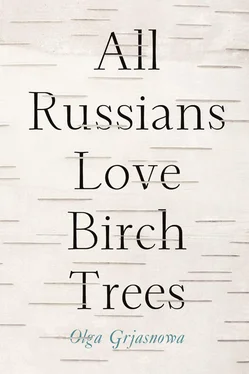I caught Ori’s puzzled glance. And so did the waiter, who, obviously amused, asked me where I was from. He spoke the extremely soft and almost songlike Palestinian that I loved so much, because it reminded me of Lebanese and therefore of Sami.
“From Germany.” In this situation this seemed like the easiest answer.
“My cousin is living in Germany. Beautiful country. But people don’t learn Arabic there?”
“I studied it.”
“That makes sense. With your classical Arabic you sound like a newscaster.” He laughed.
“What choice did I have? At the university we almost exclusively studied Fusha. Only very rarely were there classes on ‘Amia, the dialects,” I said, defending myself.
“And which dialect did you pick?”
“Lebanese,” I said, and I could feel myself blush.
The waiter smiled at me. “And your husband?” he asked me.
Ori raised his right eyebrow questioningly.
“I’m not married. I’m an interpreter.”
“Hebrew — Arabic?” he asked.
I shook my head. “I translate Russian and French.”
The waiter nodded. “French. Very romantic, but useless. The dessert is on the house.” He patted Ori’s back and headed to the next table.
“You speak Arabic?” Ori asked.
“Yes.”
“Why?” asked Tal.
“What do you mean, why?”
“You speak Arabic, but no Hebrew. That’s strange, isn’t it?”
“What use is there in learning a small language like Hebrew? If I can have a UN language instead?”
“Your Arabic isn’t bad at all,” Ori said. Tal leaned back and crossed her arms.
“You speak Arabic?” I asked Ori.
“Only what I learned in the army. But they don’t want to hear that.”
Tal rolled her eyes. Ori saw it and I could see him trying to keep his composure.
“A friend of mine is fluent in Arabic. His Arabic is better than that of most Arabs,” Ori said.
I swallowed hard.
“But only because he works for the secret service,” Tal said. Her dress was shiny black-blue. Gold jewelry glittered around her neck and in her hair.
“As did I,” Ori said.
“Then you should know what happens there.” Tal held her breath for a moment, beside herself with rage. Ori shot her a hostile look. Tal leaned back in her chair and continued, “But you spent your military service in front of a computer. You weren’t out there. You don’t know the first thing.”
The waiter now looked over contemptuously.
“Fine. You are the only fighter in the family. Are you accusing me of not having been in a combat unit? Should I have lost a leg for the country? Or an arm? Would you have preferred that?” said Ori.
Tal got up and left, slamming the door.
“Can’t we have a single conversation without it turning into a negotiation over Zionism and the entire history of Israel?” Ori leaned on his elbows.
“I’m going to check on her.”
“Go ahead. Leave me here all by myself.”
Tal was standing in front of the restaurant, smoking. I joined her. A group of Orthodox Jews hurried past, their hats covered with plastic bags to protect them from the rain.
“I don’t glorify them. I think our culture is fundamentally different from Palestinian culture. Women don’t have any rights in Arab society and there’s a lot of other shit going down there. What I care about is my country. I love my country, but not its current state. I want to live in a free, democratic state.”
“OK,” I said.
We smoked in silence. The sun lowered in the sky — a rapid succession of pink, orange, lilac, purple, and then the absence of light. As we went back inside, Tal’s hand grazed my bottom.
That night I stayed in Ori’s apartment. I told him that sleeping with him had been an accident that would never happen again. And then I told him about Elisha and said that I couldn’t recall Elisha’s face in the dark. Ori listened patiently, without saying a word. After I was done, he gave me a long hug and left the light on in the hallway. Once he returned, he held me and said nothing and that felt so good that for a long time I couldn’t stop crying. I cried because it felt good. I cried because then he pulled me closer. I cried because he wasn’t embarrassed by my tears. And I cried because he wouldn’t leave until I stopped. When the tears finally ceased, Ori fell asleep immediately. Exhausted. By me. I got up, left him a note, and went home.
A week later I was invited over to Tal’s for dinner. I hadn’t planned on going but then I was too nervous to cancel.
Besides, I had spent the morning with Hannah and Aunt No. 13 at Yad Vashem. Following the elaborate and devastating visit, Aunt No. 13 invited us for coffee and cake. In the air-conditioned cafeteria of Yad Vashem she told us about the renovations at her house that started with the purchase of a new TV (the same that my Great-aunt No. 7 had recently bought). Unfortunately, the TV didn’t fit on the wall, so she’d had a window bricked up and put it there instead. Furthermore, she had seen a nice parquet on discount at the hardware store and had bought it right away. Except that it wasn’t quite enough to cover the floor (Aunt No. 13 was a little cheap) and now it was sold out. She had to buy a different kind that looked like the other one, but later it turned out that the new kind was slightly thicker than the old one. Now she was at a loss. The Arabs who worked for her said she’d have to redo the whole thing, but Aunt No. 13 accused them of being jihadists. And now, she said, she could begin telling Hannah and me about my grandmother’s escape from the Germans. I quickly told her I knew the story already, as I feared we might never leave Yad Vashem.
“But I’m sure you don’t know the details,” Hannah said, and Aunt No. 13 turned a gratified smile on her.
“I think I do know the details,” I replied.
“Never forget,” Aunt No. 13 said.
“Of course not,” I said. “But that’s not enough.”
“What do you mean?” Hannah asked.
“Even fanatic settlers commemorate the Holocaust,” I said.
“I’m a settler, too,” said Aunt No. 13.
I bit my tongue.
Tal lived in Neve Tzedek, not far from the market where I bought flowers for her. As I was paying I kept telling myself that it wasn’t too late to go home and watch Tatort or Skype with Cem. When talking with Cem I sometimes — actually, always — asked about Sami, as I didn’t want any direct contact with him. Why this was, I didn’t quite know. So instead, I tried to make Cem my proxy. But he’d refused to cooperate, instead repeating, “Why don’t you call him yourself?”
Tal answered the intercom and buzzed me in. When I entered her apartment she was in the kitchen, preparing a big chunk of meat. She smiled at me and gave me a tender kiss on the cheek, not bothering to put down the dripping duck breast.
“I’m not quite done. Feel free to give yourself the tour if you’d like.” She was wearing a black dress, very low cut in the back. A red-and-white-checkered apron was tied around her waist. As she lovingly marinated the duck breast, I studied the tattoos on her back.
“My brother would be jealous if he saw you here.” Tal smiled at me strangely and opened a bottle of wine.
“You don’t have to tell him,” I suggested, watching my tone.
She filled my glass first and as the taste unfolded in my mouth, Tal described its provenance in great detail. The bottle was from her parents’ winery. Then, with a determined grip, she led me into the living room. On the dining room table pieces of fabric and bags of wool were piled high around a sewing machine. On the opposite wall were photos of young women in various costumes — all of them large format, pinned to the wall. Her roommate was preparing for her finals, Tal explained, and got nervous if anybody touched her things. Would it be OK if we ate on the sofa instead?
Читать дальше












